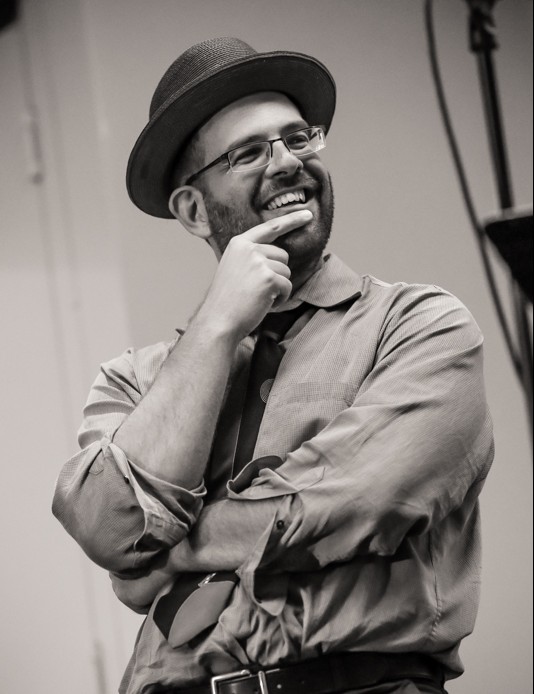“Being Jewish outside of Israel is not a zero-sum game — a spectrum of engagement and an array of choices of how to immerse in study and prayer uplifts all who are searching for meaning and celebrating our rich traditions.”
The Interviewee – Neil Blumofe, Senior Rabbi, Congregation Agudas Achim, Austin, Texas. I have lived in many places in the USA — and have chosen to reside in Austin to build a confident and thoughtful Jewish life that resonates in the fabric of the city and the state. I am active in the Austin music scene and enjoy engaging people in conversations of purpose and moments of meaning.
In your opinion, what importance, if any, does the existence of a Jewish state have to you personally and to Jewish people in general?
“The Jewish State is vitally important to me and to the Jewish people. In our diversity historically and worldwide, the Jewish State reminds us of our connections to each other and positively and consistently frames conversations about Jewish identity and legacy with a mighty, convening power.“
Do you feel committed in some way to defend the future existence of Israel?
“Yes. Defending the future existence of Israel takes a grasp of nuance and complexity and a willingness to hold multiple truths together, at the same time. While we discuss history, politics, religion, and peoplehood — we do not live within a vacuum — as Israel’s place in the world in also paramount in assuring a flourishing future.”
Do you affiliate yourself with a specific denomination in Judaism? What is your view regarding the dominance of the Orthodox denomination in Israel religious establishment?
“I serve a Masorti community. It is essential that differing streams within Judaism first humanize each other — and courageously internalize that we are all together in our pursuit of meaning and the paths of God.
“The efforts that we each make to defend and advocate for Israel should not result in our breaking Israel up into various constituent parts that can be metabolized to our own personal worldview. May we endeavor to shift long-standing cultural paradigms? If we cannot live together religiously, and if we lead with only our prepared judgment of others, then we fail to see each other which leads to our isolation, estrangement, and ultimate failure as a people and as a Jewish state.“
Do you feel morally responsible for Israel’s actions (such as its management of the Israeli-Palestinian conflict)?
“While I do, as an American — I feel similarly burdened by the policies and management of policies enacted by the USA. It is easy to feel that our voices don’t matter in determining what can be done — and to realize too that issues are far more complex and interdependent among claimants — as we assert our vision of morality and responsibility.”
In your opinion, what is the main thing Israelis fail to understand about the reality of being Jewish outside of Israel?
“That Judaism can be fun and life-affirming in its approaches to life. Being Jewish outside of Israel is not a zero-sum game — a spectrum of engagement and an array of choices of how to immerse in study and prayer uplifts all who are searching for meaning and celebrating our rich traditions. One can thrive in Judaism without opting out.”
How would you describe Israel’s policy (formally and in practice) regarding its relationship with the Diaspora?
“I would characterize Israel’s policy as haphazard — reflexively responding to various concerns and crises. I believe that Israel must recover its wonder, imagination, and power to inspire others, for their own sake — rather than getting trapped in an ever-accelerating game of brinkmanship and oneupman-ship among rivals and factions.”
In your opinion, does Israel have an obligation to defend and help Jewish communities in need?
“Yes. This is part of the power of the Jewish state. Defending and helping Jewish communities in need also means to allow them to thrive without making them homogeneous and captive to a particular hegemonic existence. This is not a quid pro quo relationship — rather, affirming Jewish communities both in Israel and in the Diaspora will strengthen all of us, together.”
Have you ever been to Israel? if you have, can you summarize your impression from the Israeli reality?
“Many times (approaching 30 times). There are many ways to immerse in Israel — and respecting the people and their everyday rhythms and ability to cope through thick and thin, helps to restore my connections to Judaism, itself. Participating in the music, the culture, and the everyday living as I have, at once shows the fragility of Israeli society and its immense strengths, as well.”
What was your best experience of Israeli culture in the past year (book, music, TV, movie, theater etc.)?
“Yossi Klein Halevi’s book — Like Dreamers. The theatrical staging of SY Agnon’s writings (in Jerusalem). The strength of the jazz scene in Israel/NYC. The Invitation to Piyyut initiatives. Music like Marsh Dondurma.”
Can you tell us a bit about the Jewish community in your hometown?
“In Austin, Texas we are a rapidly growing, diverse Jewish community. Our connection to Israel and the Israeli people is high and our patience with business as usual is thin. We are innovative, and we are looking to find commonalities to drive conversations and connections deeper — not only with those like-minded, but with those with whom we don’t agree. We love the questions more than the answers and we see Judaism as a wisdom tradition — offering a tonic for our world — as we live.”

